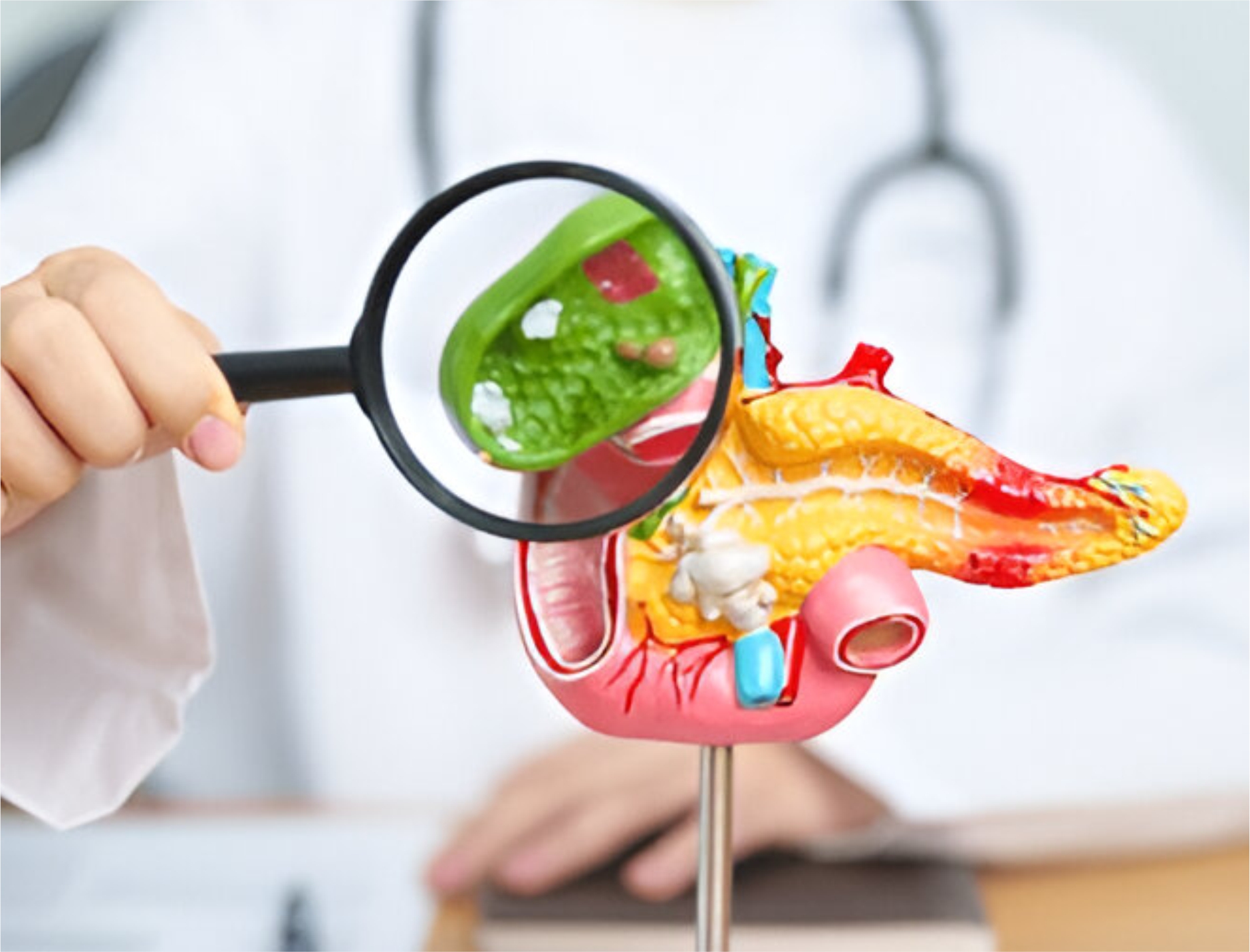Gallstones: Symptoms, Causes, and Treatment Options
Home > Blogs > Gallstones: Symptoms, Causes, and Treatment Options



Gallstones are a common digestive disorder affecting millions of people worldwide. These small, hard deposits form in the gallbladder and can lead to severe pain and other complications if left untreated. Understanding the symptoms, causes, and available treatment options is crucial for managing this condition effectively. If you are experiencing gallbladder-related issues, consulting the Best Gastroenterologist in Junagadh can help you receive the right diagnosis and treatment.
What Are Gallstones?
Gallstones are solid particles that develop in the gallbladder, a small organ located under the liver. The gallbladder plays a crucial role in digesting fats by storing and releasing bile, a digestive fluid produced by the liver. When bile contains excess cholesterol, bilirubin, or salts, it can crystallize and form gallstones.
Gallstones vary in size and number. Some people develop a single large gallstone, while others may have multiple smaller ones. In many cases, gallstones do not cause symptoms, but when they block the bile ducts, they can lead to severe pain and other complications requiring medical intervention from a Top Gastroenterologist in Junagadh.
Symptoms of Gallstones
Many people with gallstones may not experience any symptoms until the stones obstruct the bile duct. When this happens, symptoms may include:
1. Abdominal Pain
Sudden and intense pain in the upper right or middle abdomen.
Pain that lasts from a few minutes to several hours.
Pain that worsens after eating fatty or greasy foods.
2. Nausea and Vomiting
Feeling nauseous, especially after meals.
Vomiting due to severe discomfort.
3. Indigestion and Bloating
Frequent bloating and discomfort after meals.
Difficulty digesting fatty foods.
4. Jaundice
Yellowing of the skin and eyes due to bile buildup.
5. Fever and Chills
Symptoms of infection due to gallstone blockage.
Requires immediate medical attention at the Best Gastroenterology Hospital in Junagadh.
If you experience persistent abdominal pain, nausea, or jaundice, it is essential to seek medical help from the Best Gastroenterology Hospital Near Zanzarda Chowkdi to prevent complications.
Causes and Risk Factors of Gallstones
The exact cause of gallstones is not always clear, but certain factors increase the risk of developing them. These include:
1. Excess Cholesterol in Bile
When the liver secretes too much cholesterol into the bile, it can form crystals that turn into gallstones.
2. High Bilirubin Levels
Certain medical conditions, such as liver disease, blood disorders, and infections, can cause excessive bilirubin production, leading to gallstone formation.
3. Poor Gallbladder Function
If the gallbladder does not empty completely, bile can become concentrated and lead to the development of gallstones.
4. Risk Factors
Several factors can increase the likelihood of gallstones, including:
Age: People over 40 are at a higher risk.
Gender: Women are more prone to gallstones than men due to hormonal factors.
Obesity: Excess body weight increases cholesterol levels in bile.
Rapid Weight Loss: Losing weight too quickly can disrupt bile balance.
Diabetes: High blood sugar levels contribute to gallstone formation.
Family History: A family history of gallstones increases the risk.
Diet: High-fat and low-fiber diets contribute to gallstone formation.
Diagnosis of Gallstones
A Best Gastroenterologist in Junagadh will conduct several tests to diagnose gallstones, including:
Ultrasound: The most common test to detect gallstones.
CT Scan: Provides detailed images of the gallbladder and bile ducts.
MRI (Magnetic Resonance Cholangiopancreatography - MRCP): Helps detect bile duct blockages.
Blood Tests: Check for signs of infection, liver function, and bile duct obstruction.
Treatment Options for Gallstones
The treatment for gallstones depends on the severity of symptoms. If gallstones are asymptomatic, they may not require immediate treatment. However, if they cause pain or complications, the following options are available:
1. Lifestyle and Dietary Changes
For mild cases, doctors may recommend:
A low-fat diet to reduce bile production.
Smaller, frequent meals to ease digestion.
Staying hydrated to maintain healthy bile flow.
2. Medications
Certain medications can help dissolve cholesterol-based gallstones over time, but they are generally slow-acting and not always effective.
3. Non-Surgical Treatments
Shock Wave Lithotripsy: Uses sound waves to break up gallstones.
Endoscopic Retrograde Cholangiopancreatography (ERCP): Removes gallstones from the bile duct using an endoscope.
4. Surgery (Cholecystectomy)
When gallstones cause severe pain or complications, surgery may be necessary. The most common procedure is laparoscopic cholecystectomy, where the gallbladder is removed using small incisions. This minimally invasive procedure allows for a quick recovery and is performed at the Best Gastroenterology Hospital in Junagadh.
When is Surgery Needed?
Surgery is recommended if:
Gallstones cause repeated episodes of pain.
There is an infection in the gallbladder (cholecystitis).
Stones block the bile duct, leading to jaundice.
Prevention of Gallstones
While gallstones cannot always be prevented, the following lifestyle changes can reduce the risk:
Maintain a Healthy Weight: Obesity is a key risk factor for gallstones.
Eat a Balanced Diet: Include fiber-rich foods and avoid excessive fat.
Stay Hydrated: Drinking plenty of water helps maintain proper bile flow.
Exercise Regularly: Physical activity helps maintain a healthy weight and digestion.
Avoid Rapid Weight Loss: Losing weight too quickly can increase gallstone risk.
Conclusion
Gallstones are a common but manageable condition. Recognizing the symptoms and seeking timely medical advice from the Top Gastroenterologists in Junagadh can prevent complications. If you experience persistent pain, nausea, or jaundice, visiting the Best Gastroenterology Hospital Near Zanzarda Chowkdi can provide you with the right diagnosis and treatment options.
At Aayush Hospitals, Junagadh, we offer expert gastroenterology care, making us the Best Gastroenterology Hospital in Junagadh. Our team of skilled specialists ensures top-notch treatment for gallstones and other digestive disorders. Contact us today for a consultation and take the first step towards better digestive health!